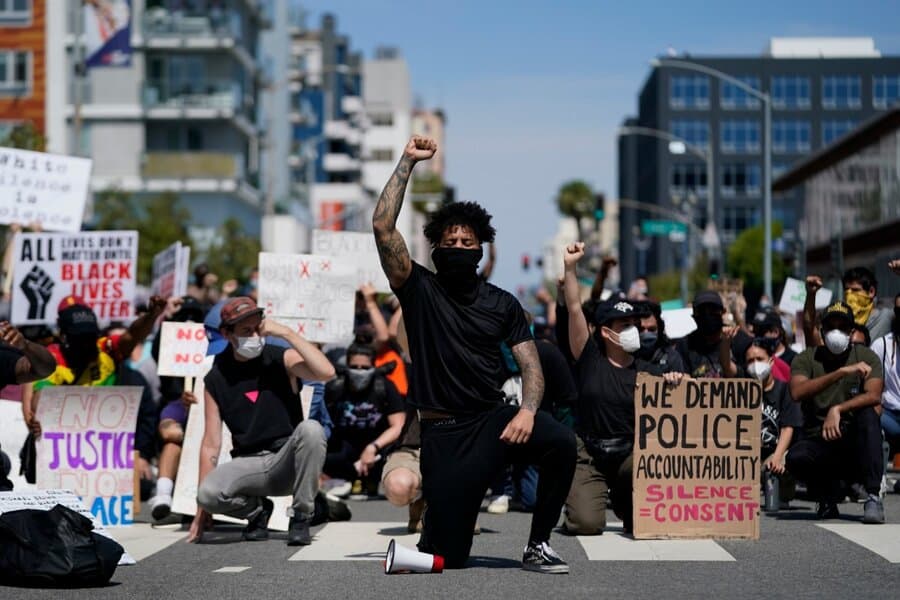
Kevin Vazquez is a staff attorney at the International Brotherhood of Teamsters. He graduated from Harvard Law School in 2023. The opinions he expresses on this blog are his own and should not be attributed to the IBT.
This week, the AFL-CIO, after eleven months of research and preparation, quietly released its report on police reform to little fanfare, in contrast to the high-profile launch of their “Racial Justice Task Force” in July 2020. As explained by Hamilton Noland this weekend for In These Times, the AFL-CIO, a vocal advocate for racial justice but, simultaneously, a representative of police unions, has long been in the unenviable position of bridging the chasm dividing these two seemingly irreconcilable interests. Nearly a year after launching the task force, however, the AFL-CIO’s report, called “Public Safety Blueprint for Change,” published on the organization’s website with no accompanying press conference or press release (or even a tweet), rejects – if not explicitly – the idea of defunding the police and instead calls for additional funding for new training techniques, among other things. It also functionally rejects calls from other activists, unions, and scholars – including Benjamin Sachs for OnLabor – for limitations to be placed on the rights of police unions to collectively bargain, or for the AFL-CIO to take steps to formally separate itself from police unions. Many union officials, activists, and organizers have expressed severe disappointment with the final report, but the AFL-CIO has yet to issue any statement on the report or its release.
In Washington, as Maxwell noted for OnLabor earlier this week, President Biden nominated Gwynne Wilcox, an experienced union lawyer, for a vacant seat on the National Labor Relations Board, a move that has earned praise from many of the largest unions in the country. Wilcox, who has been a partner at Levy Ratner, a labor-side law firm in New York, for years, which included litigation as part of the Fight for $15 campaign, would be the first Black woman to serve on the board. Biden’s nomination of Wilcox was immediately praised by the AFL-CIO, Teamsters, and UFCW, among other notable unions – although many Republicans, predictably, viewed the nomination somewhat differently. In any event, the Board presently has a 3-to-1 Republican majority – a relic from the Trump Administration – but, if Wilcox is confirmed by the Senate, which major unions are calling for it to do swiftly, Biden will be able to give control to Democrats when the next seat, that belonging to William Emanuel, becomes vacant in August as his term expires.
In other news, since the CDC announced its lifting of the indoor mask mandate for vaccinated individuals on May 13, unions – and many public health experts – have been increasingly critical of the decision, as explicated in a piece published in Salon on Saturday. Unions representing healthcare professional and frontline workers, in particular, such as the New York State Nurses Association and UFCW, have pushed back against the relaxation of the mask mandate, saying that workers, who have already paid a tremendous price throughout the course of the pandemic, are again being asked to pay for the nation’s lack of preparation. These unions were especially critical of the CDC’s decision to utilize the “honor system,” relying on customers’ self-identification as vaccinated, which, they suggest, not only puts workers at risk because of potential dishonesty, but also risks turning them into “vaccination police,” responsible for determining who has and has not been inoculated. It is, of course, not difficult to recognize, as many union leaders have, that many of those most resistant to wearing masks are also least likely to get vaccination, a troubling pattern that poses clear risks to frontline workers. Political and economic interests have trumped concerns of unions or public policy experts throughout the pandemic, and perhaps, even as it finally winds to some sort of a close, similar mistakes are being made – and workers, again, will be asked to pay the price.
Finally, on Thursday, Richard Trumka, in an opinion piece published in the Wall Street Journal, offered a rejoinder to an earlier piece written by Kimberley Strassel, a conservative columnist, entitled “Biden’s Big Labor Bind,” and argued that the PRO Act, rather than “force” American workers to do anything, like many conservatives, such as Strassel, and business groups have stipulated, will “give workers [a] choice” to participate in “workplace democracy.” Labeling Strassel’s piece, which contended that the PRO Act, through its nullification of right-to-work laws in 27 states, would “force” workers to join unions and “strip companies of basic rights,” a “laundry list of antiworker talking points,” Trumka suggested that, in contrast, the PRO Act strengthens the American Jobs Plan – and, besides being good policy, is also good politics, supported by nearly two-thirds of voters, and even nearly three out of five Republicans. The article is a strong defense of the PRO Act, which, despite its manifest necessity and popularity (and its resounding bipartisan passage in the House), remains hostage to the unyielding filibuster in the Senate.






Daily News & Commentary
Start your day with our roundup of the latest labor developments. See all
July 14
More circuits weigh in on two-step certification; Uber challengers Seattle deactivation ordinance.
July 13
APWU and USPS ratify a new contract, ICE barred from racial profiling in Los Angeles, and the fight continues over the dismantling of NIOSH
July 11
Regional director orders election without Board quorum; 9th Circuit pauses injunction on Executive Order; Driverless car legislation in Massachusetts
July 10
Wisconsin Supreme Court holds UW Health nurses are not covered by Wisconsin’s Labor Peace Act; a district judge denies the request to stay an injunction pending appeal; the NFLPA appeals an arbitration decision.
July 9
the Supreme Court allows Trump to proceed with mass firings; Secretary of Agriculture suggests Medicaid recipients replace deported migrant farmworkers; DHS ends TPS for Nicaragua and Honduras
July 8
In today’s news and commentary, Apple wins at the Fifth Circuit against the NLRB, Florida enacts a noncompete-friendly law, and complications with the No Tax on Tips in the Big Beautiful Bill. Apple won an appeal overturning a National Labor Relations Board (NLRB) decision that the company violated labor law by coercively questioning an employee […]